 W
WAmerican Woman is a 2003 novel written by the American writer Susan Choi, based on the 1974 kidnapping of Patty Hearst by the Symbionese Liberation Army.
 W
WBetween Heaven and Hell: A Dialog Somewhere Beyond Death with John F. Kennedy, C. S. Lewis, & Aldous Huxley is a novel by Peter Kreeft about U.S. President John F. Kennedy, and authors C. S. Lewis and Aldous Huxley meeting in Purgatory and engaging in a philosophical discussion on faith. It was inspired by the fact that all three men died on the same day: November 22, 1963. We see from the three points of view: Kennedy's "modern Christian" view, Lewis's "conservative Christian" or "mere Christian" view, and Huxley's "Orientalized Christian" view. The book progresses as Lewis and Kennedy discuss Jesus's being God incarnate, to Lewis and Huxley discussing whether or not Jesus was a deity or "just a good person."
 W
WBoomsday, a 2007 novel by Christopher Buckley, is a political satire about the rivalry between squandering Baby Boomers and younger generations of Americans who do not want to pay high taxes for their elders' retirement.
 W
WThe Colony of Unrequited Dreams is a novel by Wayne Johnston, published on September 30, 1998 by Knopf Canada. Johnston's breakthrough work, the novel was a Canadian bestseller, and was shortlisted for the 1998 Giller Prize and the 1998 Governor General's Award for English fiction.
 W
WThe Conscience of the Rich is the seventh published of C. P. Snow's series of novels Strangers and Brothers, but the third according to the internal chronology. It details the lives of Charles, Katherine and their father, Leonard March, a wealthy Jewish family. Lewis Eliot narrates the story of the conflicting politics of wealth and pre-World War II socialism in England.
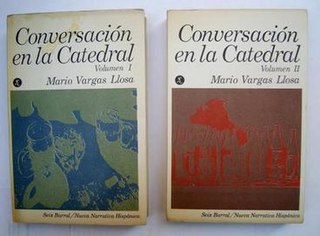 W
WConversation in The Cathedral is a 1969 novel by Spanish-Peruvian writer and essayist Mario Vargas Llosa, translated by Gregory Rabassa. One of Vargas Llosa's major works, it is a portrayal of Peru under the dictatorship of Manuel A. Odría in the 1950s, and deals with the lives of characters from different social strata. The ambitious narrative is built around the stories of Santiago Zavala and Ambrosio respectively; one the son of a minister, the other his chauffeur. A random meeting at a dog pound leads to a riveting conversation between the two at a nearby bar known as the cathedral. During the encounter Zavala tries to find the truth about his father's role in the murder of a notorious Peruvian underworld figure, shedding light on the workings of a dictatorship along the way.
 W
WCorridors of Power is the ninth book in C. P. Snow's Strangers and Brothers series. Its title had become a household phrase referring to the centres of government and power after Snow coined it in his earlier novel, Homecomings.
 W
WDamage is a 1991 novel by Josephine Hart about a British politician who, in the prime of life, causes his own downfall through an inappropriate relationship. It was adapted into a film of the same title by Louis Malle in 1992, as well as into an opera by Greek composer Kharálampos Goyós in 2004.
 W
WDesmond is an epistolary novel by Charlotte Turner Smith, first published in 1792. The novel focuses on politics during the French Revolution.
 W
WEquality; or, A History of Lithconia is a utopian fantasy novel. It is the first American utopian novel. The author is unknown, though Donald H. Tuck speculates that it could be Dr. James Reynolds, a zealous liberal crusader. The novel was originally serialized in 8 parts in the weekly newspaper, The Temple of Reason, beginning in 1802. It was first published in book form by the Liberal Union in 1837.
 W
WThe Fatwa Girl is a 2011 novel by Pakistani author Akbar Agha. It is story of love and innocence lost in the Pakistan of today, where modernity is symbolized by the possession of a nuclear bomb, but where religious hatreds are as old as time itself.
 W
W'GAPÔ is a 1988 Tagalog novel written by award-winning Filipino author Lualhati Bautista. Its complete title is 'GAPÔ at isang puting Pilipino, sa mundo ng mga Amerikanong kulay brown which means "'Gapô and one white Filipino, in a world of brown Americans" in translation. 'Gapô is an abbreviated form of the Philippine place name Olongapo.
 W
WGeorge Passant is the first published of C. P. Snow's series of novels Strangers and Brothers, but the second according to the internal chronology. It was first published under the name Strangers and Brothers. It was not published in the U.S. until 1960.
 W
WA God in Ruins is a 1999 novel by Leon Uris.
 W
WHayduke Lives!, written in 1989 by Edward Abbey, is the sequel to the popular book The Monkey Wrench Gang. It was published posthumously in 1990 in a mildly unfinished state, as Abbey did not complete revision prior to his death. Thus, the book retains much of its author's unrefined musings.
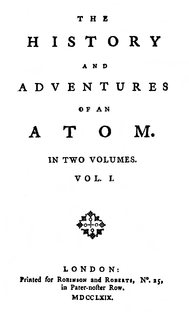 W
WThe History and Adventures of an Atom is a novel by Tobias Smollett, first published in 1769. The novel that savagely satirises English politics during the Seven Years' War.
 W
WThe Informer is a novel by Irish writer Liam O'Flaherty published in 1925. It received the 1925 James Tait Black Memorial Prize.
 W
WThe Light and the Dark is the fourth novel in C. P. Snow's Strangers and Brothers series. The book portrays narrator Lewis Eliot's friendship with Roy Calvert, and Calvert's inner turmoil and quest for meaning in life. Calvert was based on Snow's friend, Coptic scholar, Charles Allberry. Their relationship is developed further in The Masters.
 W
WThe Man Who Wouldn't Stand Up won the 2013 International Rubery Book Award and is a 2012 satirical novel by the American writer Jacob M. Appel. "Shortly after the attacks of September 11, 2001, in the United States," the author explained, "I knew I wanted to write a book against the backlash of those events. It took me three years to complete…. At the time, I did not think it would take me another eight years to find a publisher. I came close many times, but American publishers appeared to fear the political content of the work and several of them admitted this candidly or even asked me to 'sanitize' the novel." In 2012, it won the Dundee International Book Prize, one of the UK's most lucrative prizes for an unpublished debut novel, and was published by Cargo Publishing.
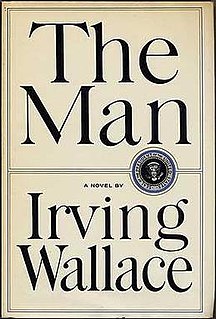 W
WThe Man is a 1964 novel by Irving Wallace that speculatively explores the socio-political consequences in U.S. society when a black man becomes President of the United States. The novel's title derives from the contemporary — fifties, sixties, seventies — American slang English, "The Man".
 W
WMelincourt is the second novel of Thomas Love Peacock, published in 1817. It is based on the "idea of an orang-outang mimicking humanity". An orangutan called Sir Oran Haut-Ton is put forward as a candidate for election as a Member of Parliament.
 W
WThe Mouse on the Moon is a novel by Irish author Leonard Wibberley. It was released in 1962 as the sequel to The Mouse That Roared. In it, the people of the Duchy of Grand Fenwick, an isolated mountain microstate, attempt space flight using wine as a propellant. It satirizes the space race, Cold War and politics. It was adapted into a film The Mouse on the Moon in 1963.
 W
WNo Love for Johnnie by Wilfred Fienburgh, was first published in 1959 by Hutchinson. Essentially a political novel it deals with the life of Johnny Byrne, a cynical and burnt-out politician whose career has ostensibly stalled due to his leftist leanings in a "conservative" Labour government. It was made into a film in 1961, directed by Ralph Thomas.
 W
WThe Partisan Leader; A Tale of The Future is a political novel by the antebellum Virginia author and jurist Nathaniel Beverley Tucker. A two-volume work published in 1836 in New York City and in 1837 in Washington, D.C. under the pen-name "Edward William Sydney," the novel is set thirteen years into the future, in 1849, and imagines a world where the American states south of Virginia have seceded from the Union. The story traces the formation of a band of Virginia insurgents who seek to free their state from federal control and adjoin it to the independent Southern Confederacy.
 W
WA Planet Called Utopia is a science fiction novel by Scottish writer J. T. McIntosh, first published in August, 1979 in New York by Zebra Books. It is the last book published by the author.
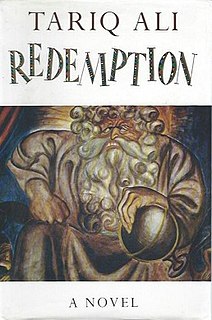 W
WRedemption, the first novel by author, historian and former Trotskyist Tariq Ali, is a roman à clef and apostate satire of the inability of Trotskyists to handle the downfall of the Eastern bloc.
 W
WRoscoe is a novel by William Kennedy. Published in 2002, Roscoe depicts an aging politician who is a key behind-the-scenes player in Albany, New York's Democratic Party machine. Although many names have been changed and events added, the book is based on the O'Connell Machine that controlled Albany for decades. Some occurrences in the novel are based on actual events. Many of Kennedy's older relatives were minor figures in the machine.
 W
WSultan of Najd is a political economic novel by Abdullah Al-Salloum. The novel interprets –within the ancient Ukhaydhariya State– a series of events that exposed what was unknown by the throne, not only within the monetary scope, but the state politics, where the Emir gets introduced to reforming schemes meant to achieve the state’s sustainability. The title was ranked the third bestseller on Amazon's Arabic Literature and Fiction category.
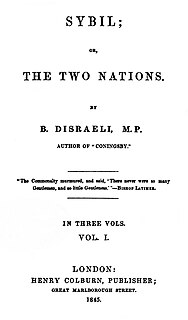 W
WSybil, or The Two Nations is an 1845 novel by Benjamin Disraeli. Published in the same year as Friedrich Engels's The Condition of the Working Class in England in 1844, Sybil traces the plight of the working classes of England. Disraeli was interested in dealing with the horrific conditions in which the majority of England's working classes lived — or, what is generally called the Condition of England question.
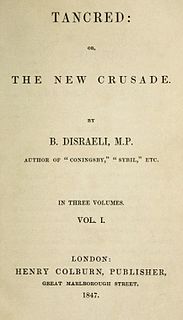 W
WTancred; or, The New Crusade (1847) is a novel by Benjamin Disraeli, first published by Henry Colburn in three volumes. Together with Coningsby (1844) and Sybil (1845) it forms a sequence sometimes called the Young England trilogy. It shares a number of characters with the earlier novels, but unlike them is concerned less with the political and social condition of England than with a religious and even mystical theme: the question of how Judaism and Christianity are to be reconciled, and the Church reborn as a progressive force.
 W
WTen North Frederick is a novel by John O'Hara, published by Random House in 1955. It tells the story of Joe Chapin, an ambitious man who desires to become president of the United States, and his relationships with his patrician wife, two rebellious children, and mistress.
 W
WTerm Limits, published in 1997, is the first political thriller novel by Vince Flynn.
 W
WTime of Hope is the first chronological entry in C. P. Snow's series of novels Strangers and Brothers, and the third to be published. It depicts the beginning of Lewis Eliot's life, with a childhood in poverty in a small English town at the beginning of the 20th century.
 W
WThe Valley of Amazement is a novel by Amy Tan. Like many of her works, it deals with mother-daughter relationship and is partly set in historical China. An excerpt from the novel was published independently as Rules for Virgins.
 W
WThe Voyage to Icaria is a novel written by Étienne Cabet and published in 1840. In this romance, he described a communistic utopia, whose terms he had dreamed out; and he began at once to try to realize his dream. He framed a constitution for an actual Icaria. The Icarians were a French utopian movement, founded by Étienne Cabet, who led his followers to America where they established a group of egalitarian communes during the period from 1848 through 1898. Karl Marx mentions Voyage en Icarie in an 1843 letter to Arnold Ruge, contrasting the "communist utopia" of the book with the real and pragmatic conditions necessary for building socialism in the Germany of his time.
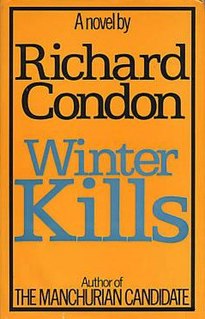 W
WWinter Kills is a black comic novel by Richard Condon, exploring the assassination of a U.S. President. It was published in 1974. The novel parallels the death of John F. Kennedy and the conspiracy theories about it.